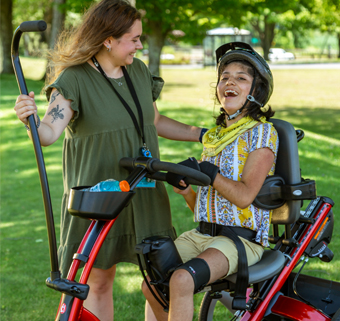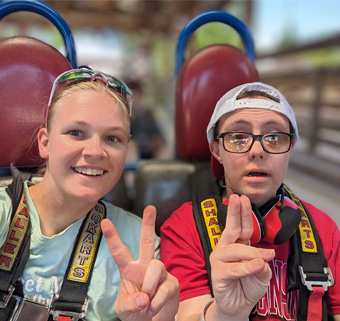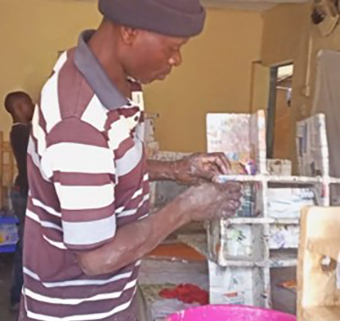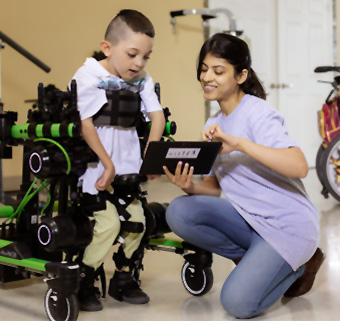Running for Scott
| April 2012Contributed by Jennifer Burke, caregiver
 A few years ago I was looking around for a part-time job when I heard that the parents of one of my students were looking for help for their 9-year-old son. They were offering $10 an hour. I took it. I had no idea my life would change forever.
A few years ago I was looking around for a part-time job when I heard that the parents of one of my students were looking for help for their 9-year-old son. They were offering $10 an hour. I took it. I had no idea my life would change forever.
Before I first met Scott I was told he used to be a “normal” kid. But the boy I met was anything but. He was in a wheelchair with a breathing tube. He didn’t talk. He was fed through a G-tube.
I started going to Scott’s house twice a week. I would just sit with him for a few hours until one of his nurses arrived. My job was to monitor his blood oxygen level – just watch his numbers.
At first that’s all we did. He watched TV, I watched his numbers. I don’t know what he was seeing; he never reacted to what he saw. And he slept a lot of the time, which meant I could do my homework, always with one eye on his numbers.
But after a few months this became unbearably boring. I figured I might as well make the best of it, so I started reading to him. I sat him up at a desk. I talked to him. I took him for walks in the neighborhood. But I still watched his numbers.
I started eating dinner with his family sometimes. And I realized I was starting to enjoy hanging out with Scott. I was looking forward to it. I wanted to find out more about who this boy was.
Scott’s family shared with me some videos of him before he became sick. I couldn’t believe it was the same kid. He was hilarious. But at four years old he was diagnosed with ROHHAD Syndrome, an extremely rare disorder. (There are less than 100 cases worldwide.) He began to lose everything he had. He slowly became fragile and transformed into the special child I had met. But now I knew this was not the real Scott.
 I knew the real Scott was still locked up somewhere in that helpless body. I wanted to find him. So I tried something new. I went to the Laremont School, a special school Scott had attended, and asked if I could borrow one of their adaptive tricycles over the summer. I thought maybe Scott could ride it in his neighborhood.
I knew the real Scott was still locked up somewhere in that helpless body. I wanted to find him. So I tried something new. I went to the Laremont School, a special school Scott had attended, and asked if I could borrow one of their adaptive tricycles over the summer. I thought maybe Scott could ride it in his neighborhood.
The first day I put him on that bike I met the real Scott. Not an overweight, under-active, seizure-ridden, medically fragile boy, but the real Scott Conlon. I’ll never forget the moment.
We spent that whole summer together, me and Scott. Every day I drove 45 minutes to his house so we could hang out together. I watched his numbers, and Scott rode his bike all over the neighborhood. It was the best summer of my life.
That fall Scott’s family ordered him a Rifton trike of his own for his 10th birthday. That bike was used every day, rain or shine. It brought Scott to life again. For one glorious year I got a chance to know and love Scott as he really was.
My Scott, my quietest friend, passed away suddenly a couple weeks after his 11th birthday. He took half my heart with him. I carried his casket and wished there were numbers to watch as we walked to the gravesite. But there were no numbers.
I learned so much from Scott. I learned that blood oxygen numbers do not mean as much as a spoken word, a smile, a knowing look. I learned that how we treat people matters. I learned it’s important to notice those around us even if it appears they don’t notice us. I learned that every child, no matter what special need they have, is still a child. And children love bikes.
 After Scott died I found I needed to find a way to remember what he had taught me. I had started distance running that January to get in better shape, and one day on a cold Wisconsin 5K race “Running for Scott” was born.
After Scott died I found I needed to find a way to remember what he had taught me. I had started distance running that January to get in better shape, and one day on a cold Wisconsin 5K race “Running for Scott” was born.
It started as an idea. And soon a small group of six formed, all who had known Scott and shared my wish to remember him. In less than five months our group had grown to 70. By the end of the year we were 120.
Every year we go “Running for Scott” to raise money to buy adaptive tricycles for Laremont School and students who need a trike at home. And every time I go out for a run I remember Scott and what he did for me.




